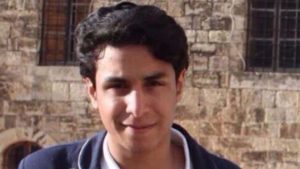IRAN: TWO JUVENILES AT RISK OF EXECUTION
Fatemeh Salbehi is at risk of imminent execution for allegedly murdering her husband almost three years ago, when she was a 16-year-old schoolgirl. A young man, 19-year-old “Ehsan” (last name known to Amnesty International), also faces imminent execution after being convicted of “sodomy” for an alleged male rape, despite the withdrawal of the allegation by his accuser.
Fatemeh Salbehi’s husband, Hamed Sadeghi, said to be an employee of the Public Relations Office of the local judiciary, was found dead in their home in Shiraz in May 2008, when Fatemeh was at school. Fatemeh Salbehi was arrested and interrogated without the presence of a lawyer. Fatemeh Salbehi first “confessed” to murder, but then stated that two others broke into the home she shared with her husband and killed him. Fatemeh Salbehi was convicted of murder by Branch Five of the Fars Criminal Court and sentenced to death. This sentence was later upheld by the Supreme Court.
“Ehsan” was arrested at the age of 17 after a man brought a complaint against him and two other youths, alleging that the three had attempted to rape him. Reportedly tortured for almost a month, “Ehsan” “confessed” to the charges during interrogations, but later in court withdrew his “confession” and denied all the allegations. Fars General Court convicted “Ehsan” of “sodomy” (lavat), and sentenced him to death. Of the court’s five judges, one deemed “Ehsan” not guilty and asked for his release. The man who initially pressed charges took back his allegations against all three accused youths prior to the first trial. The death sentence was confirmed by Branch 13 of the Supreme Court in Tehran and once “Ehsan” turned 18, he was transferred from a juvenile detention centre to Adel Abad Prison in Shiraz. It is not clear to Amnesty International whether the Head of the Judiciary has given his approval for the execution, but if so, “Ehsan” could be executed at any moment.
PLEASE WRITE IMMEDIATELY.
* Call on the Iranian authorities to halt the executions of Fatemeh Salbehi and “Ehsan”, and commute their death sentence.
* Remind them that Iran is a state party to the International Covenant on Civil and Political Rights (ICCPR) and the Convention on the Rights of the Child (CRC), which prohibit the use of the death penalty against people convicted of having committed crimes which took place when they were under 18.
* Express concern that neither Fatemeh Salbehi nor “Ehsan” had a fair trial.
* Urge the Iranian authorities to investigate the allegations that “Ehsan” was tortured, to bring anyone found responsible for abuses to justice, and to disregard as evidence in courts any “confessions” which may have been coerced.
DIRECT YOUR MESSAGES TO
Leader of the Islamic Republic:
Ayatollah Sayed ‘Ali Khamenei
The Office of the Supreme Leader
Islamic Republic Street – End of Shahid Keshvar Doust Street
Tehran, Islamic Republic of Iran
Email: info_leader@leader.ir
Via website: http://www.leader.ir/langs/en/index.php?p’letter (English)
Salutation: Your Excellency
Head of the Judiciary:
Ayatollah Sadegh Larijani
c/o Public relations Office
Number 4, 2 Azizi Street
Vali Asr Ave., above Pasteur Street intersection
Tehran, Islamic Republic of Iran
Email: bia.judi@yahoo.com
(In the subject line, write FAO Ayatollah Sadegh Larijani)
Salutation: Your Excellency
AND COPIES TO:
Mr Kambiz Sheikh Hassani
Chargé d’Affaires, Embassy for the Islamic Republic of Iran
245 Metcalfe Street
Ottawa, Ontario K2P 2K2
Fax: (613) 232-5712
Email: executive@salamiran.org
Secretary General, High Council for Human Rights:
Mohammad Javad Larijani
High Council for Human Rights
c/o Office of the Head of the Judiciary
Pasteur St., Vali Asr Ave. south of Serah-e Jomhouri
Tehran 1316814737,Islamic Republic of Iran
Email: info@humanrights-iran.ir
(In the subject line, insert FAO Mohammad Javad Larijani)
ADDITIONAL INFORMATION
Fatemeh Salbehi was born in November 1991 and was 16 years old at the time of her marriage in 2007 to Hamed Sadeghi, a man almost twice her age. He was a distant relative of the family. She had never met him before her marriage. Under Iranian law, girls may be married at the age of 13, although fathers can apply to the courts for permission for their daughters to marry when they reach the age of nine lunar years (approximately eight years and nine months). Boys can marry from the age of 15 years.
Amnesty International is not aware of Fatemeh Salbehi undergoing any medical examinations to establish her psychological state after her husband’s death. Under Iranian law, those convicted of murder and sentenced to “retribution” (qesas) have no right to seek pardon or commutation of their death sentence from the state as is required by Article 6(4) of the ICCPR. Instead, Fatemeh Salbehi’s husband’s blood relatives will decide whether to insist on her execution, or to accept compensation.
In January 2007, the Committee on the Rights of the Child, which oversees the implementation of the Convention on the Rights of the Child, made General Comment 52 that “legal or other appropriate assistance must be present” for children (defined as under the age of 18), beginning from the interrogation by the police and during all subsequent proceedings, not limited to only judicial proceedings. Fatemeh Salbehi was interrogated by the police without the presence of a lawyer. Furthermore, it not known whether Fatemeh Salbehi was provided with any other type of assistance during the police interrogation when she made her “confession”. During the trial, Fatemeh Salbehi retracted her “confession”.
According to Article 111 of the Iranian Penal Code, “sodomy” is punishable by death, although the method of execution is at the discretion of the judge. There is no separate offence of rape in the Iranian Penal Code, and allegations of rape are dealt with under this article. A male rape victim is not liable to execution under this law.
The execution of juvenile offenders is prohibited under international law, including Article 6(5) of the International Covenant on Civil and Political Rights (ICCPR) and the Convention on the Rights of the Child (CRC), to which Iran is a state party. However, since 1990, Iran has executed at least 47 juvenile offenders – that is, people convicted of having committed crimes which took place when they were under 18 years old. Eight of these executions were in 2008 and five in 2009. The last juvenile offender known to be executed was a youth known only as “Mohammad A.” who was executed on 10 July 2010 in Marvdasht, Shiraz. He had been convicted of alleged rape and murder when he was 17. Amnesty International has compiled a list of over 140 juvenile offenders sentenced to death in recent years, although it is difficult to monitor their subsequent fate.
When Iran ratified the Convention of the Rights of the Child, Iran’s Council of Guardians, (a body of 12 jurists which reviews all laws for conformity to the Constitution and to Islamic law) clarified that it regarded certain articles to be in contravention of Shari’a law and would not therefore apply to the Convention entered by Iran. However, the Council of Guardians did not include Article 37 in its list, which states “No child shall be subjected to torture or other cruel, inhuman or degrading treatment or punishment. Neither capital punishment nor life imprisonment without possibility of release shall be imposed for offences committed by persons below eighteen years of age.” In practice, this prohibition as been ignored by Iranian judges and Iran is one of only a handful of countries to sentence to death alleged juvenile offenders.
For more information about executions of juvenile offenders in Iran, see Iran: The last executioner of children (MDE 13/059/2007), http://web.amnesty.org/library/index/engmde130592007.



